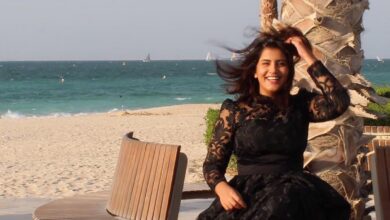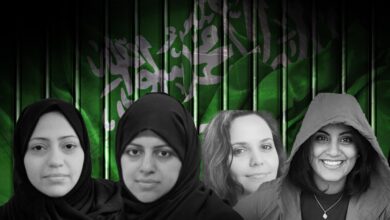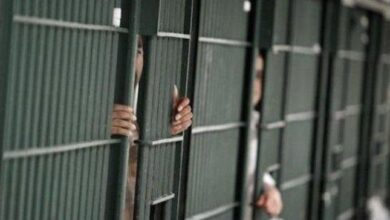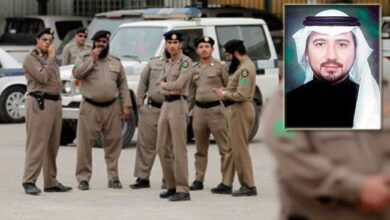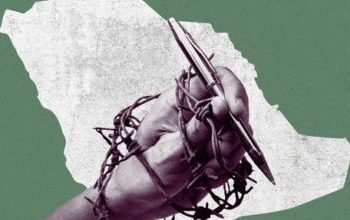Death in Saudi prisons: Long record of crimes and victims
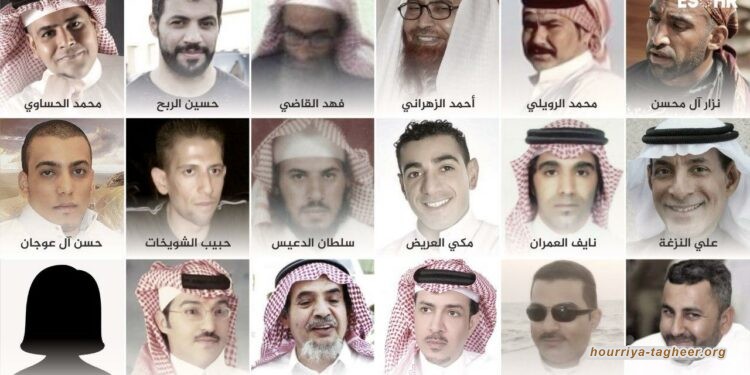
In light of grave violations of torture, ill-treatment, and medical neglect, death cases in the prisons of the Al Saud regime are frequent among prisoners of conscience in mysterious circumstances.
The House of Saud authorities ignore the investigations and results of the circumstances of the victims’ deaths, but human rights accusations prove that the authorities deliberately assassinated the detainees.
The Saudi authorities did not form an investigation committee to find out the causes of the death of journalist Saleh Al-Shehi on July 19, 2020, two months after his sudden release from prison.
The European-Saudi Organization for Human Rights highlighted some cases of death in the House of Saud prisons.
The deaths were classified according to torture or medical neglect, as well as mysterious cases.
Torture to death
Makki Al-Areedh: On March 4, 2016, the young handball player Makki Al-Areedh was killed from torture, two days after he was arrested at a checkpoint and tortured at Al-Awamiya police station.
His family demanded to collect his body, and after receiving it, the photos and video clips showed marks of heinous torture on his body.
These included beatings, electric shocks, extinguishing cigarettes and cutting with sharp tools.
Muhammad Reda Al-Hassawi: In January 2017, the young detainee in the Dammam Investigation Prison, Muhammad Radhi Al-Hassawi, died, and that was two years after his arrest.
Activists posted pictures on social media that showed bruises on his body and marks on his hands, which are believed to have resulted from being hung from them for a long time.
Yemeni citizen
Sultan Al-Dais: In December 2010, the Yemeni citizen, Sultan Al-Dais, died in Al-Tarafiyah prison in Buraidah.
Al-Dais was arrested in October 2006 and confirmed, on family visits, that he had been tortured.
After he allowed his brother to see his body, the family noticed that his body had clear marks of torture and beatings on various parts of the body.
Nizar Al Mohsen: On November 16, 2016, the young Nizar Al Mohsen died in Tarout Police Station.
The official authorities claimed that the cause of his death was cardiac arrest, but sources contacted the organization and reported that the forensic doctor confirmed that his death was due to internal bleeding.
Faking suicide
Jaber Habib Al-Aqili: arrested on January 7, 2017, on charges of “sailing” in a restricted area. His death was announced on January 12, 2017, in mysterious circumstances.
The Saudi authorities claimed that Al-Aqili hanged himself inside the prison, but his family rejected the authorities’ story that had previously committed similar crimes inside prisons.
Ali Al-Nazgha: In March 2018, the detainee Ali Jasem Al-Nazgha, 61, died in the Mabahith prison.
Al-Nazgha was arrested on November 6, 2017, while walking around in his village coinciding a soldier’s killing in the town of Al-Bahari in Al-Qatif Governorate.
READ: A recently released prisoner of conscience unable to walk
Al-Nazaha, a retired employee, is the father of seven boys and girls. He left his home to buy food for his family, but he was arrested in the meantime.
A few months later, a corpse was returned to his family. National information indicated that his family was prevented from photographing his body, in what believed to conceal marks of torture.
Hussein Al-Rabbah: In November 2019, the detained bodybuilder Hussein Abdulaziz Al-Rabeh died in the General Investigation Prison in Saudi Arabia.
Al-Rabeh has been subjected to brutal torture at multiple times, since his arrest in August 2017.
Mysterious death
Hanan Al-Dhabiani: On October 10, 2016, Saudi activists confirmed the death of female detainee Hanan Al-Dhabyani in Dhahban prison in Jeddah.
According to information provided by activists, Dhabyani died in mysterious circumstances.
The information indicated that Dhahban prison administration summoned Hanan’s family to pray for her inside the prison, and they only allowed them to see her face.
After that, she was buried in a secret location that even her family did not know, and the prison administration forced them to sign a declaration stating that she died naturally.
Hamad Abdullah Al-Salhi: In March 2018, Hamad Abdullah Al-Salihi died in Al-Tarfiyah Prison in Buraidah.
According to ALQST, Al-Salhi was arrested in October 2004 and sentenced to 3 years imprisonment, and he remained more than 13 years, including seven years in solitary confinement.
He was not released even after the sentence’s termination and with the significant deterioration in his health.
Muhammad Bani Al-Ruwaili: On July 17, 2018, Muhammad Bani Al-Ruwaili, the famous “King of Dahha”, died inside the city general Jin in Skaka in the Al-Jouf region.
Fabricated accusations
Lotfi Al Habib: In August 2018, Saudi authorities arrested Lotfi Al Habib, 44, after a traffic accident with a police patrol, which they claimed was an intentional accident.
After three days, his family received a phone call from Tarout police, in which they said that he had died after he committed suicide in the detention centre. However, the family questioned these allegations.
Bashir Al-Mutlak: On August 25, 2018, the 40-year-old Bashir Al-Mutlaq died in the Mabahith prison in Dammam.
Official authorities announced that he had suffered a stroke in prison, but social sources confirmed that he suffered from pain and complications of torture.
Nayef Ahmad Al-Omran: On January 18, 2019, the young man, Nayef Al-Omran, died in prison.
Al-Omran was arrested in 2011, and his family was surprised by the Dammam Investigation Prison administration’s contact to inform them that he had received his body, as they said that he died suddenly.
Prominent advocate
Fahd Al-Qadi: On November 13, 2019, Sheikh Fahd Al-Qadi died in Al-Malaz Prison in Riyadh.
The judge was arrested in 2016 and sentenced to 6 years in prison for expressing his opinion. He died hours after being taken to hospital.
His family indicated that he was suffering from acute pneumonia, which raises questions about whether he received the necessary medical attention, or was a medical negligence victim.
Saleh Al-Shehi: On July 19, 2020, journalist and writer Saleh Al-Shehi passed away.
He was released suddenly on May 19, 28 months after his arrest since January 3, 2018, for criticizing the corruption of the circle surrounding King Salman in the royal court.
Reliable local sources told the Gulf Center for Human Rights that his health had already deteriorated while he was in prison and suffered poor conditions.
Against prisons torture
The European-Saudi Organization for Human Rights confirmed that the lack of transparency in handling the Al Saud authorities with cases and the policy of intimidation and intimidation imposed on civil society would prevent access to the real number of prison victims.
The organization believed that there is no independent legal environment that can contribute to taking measures that do justice to these victims and their families and ensure that death cases are not repeated in the House of Saud prisons.
The organization stressed that these violations are a clear example of the nature of Saudi Arabia’s circumvention of international commitments, especially the Convention against Torture.

